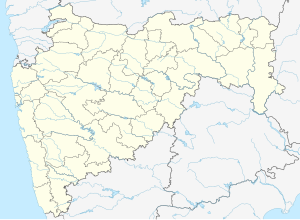Janjira
| Murud-Janjira | |
|---|---|
| मुरुड जंजिरा | |
| Raigad district, Maharashtra | |

Murud Janjira panoramic view
|
|

View inside Murud Janjira
|
|
| Coordinates | 18°17′59″N 72°57′51″E / 18.299773°N 72.964239°ECoordinates: 18°17′59″N 72°57′51″E / 18.299773°N 72.964239°E |
| Type | Island fort |
| Site information | |
| Owner | Government of India |
| Controlled by | Siddis |
| Open to the public |
yes |
| Condition | Partially intact |
| Site history | |
| Materials | Stone |
Murud-Janjira (![]() pron. ) is the local name for a fort situated on an island just off the coastal village of Murud, in the Raigad district of Maharashtra, India.
pron. ) is the local name for a fort situated on an island just off the coastal village of Murud, in the Raigad district of Maharashtra, India.
The word Janjira is not native to India, and may have originated after the Arabic word Jazeera, which means an island. Murud was once known in Marathi as Habsan ("of Habshi" or Abyssinian). The name of the fort is a concatenation of the Konkani and Arabic words for Island, "morod" and "jazeera". The word "morod" is peculiar to Konkani and is absent in Marathi.
Murud-Janjira Fort is situated on an oval-shaped rock off the Arabian Sea coast near the port town of Murud, 165 km (103 mi) south of Mumbai. Janjira is considered one of the strongest marine forts in India. The fort is approached by sailboats from Rajapuri jetty.
The main gate of the fort faces Rajapuri on the shore and can be seen only when one is about 40 feet (12 m) away from it. It has a small postern gate towards the open sea for escape.
The fort has 26 rounded bastions, still intact. There are many cannons of native and European make rusting on the bastions. Now in ruins, the fort in its heyday was a full-fledged living fort with all the necessary facilities, e.g., palaces, quarters for officers, mosque, two small 60-foot-deep (18 m) natural fresh water lakes, etc. On the outer wall flanking the main gate, there is a sculpture depicting a tiger-like beast clasping elephants in its claws.
The palace of the Nawabs of Janjira at Murud is still in good shape.
A special attraction of this fort are 3 gigantic cannons named Kalalbangdi, Chavri and Landa Kasam. These cannons were said to be feared for their shooting range. Another gate to the west is sea-facing, called 'Darya Darwaza'.
...
Wikipedia

